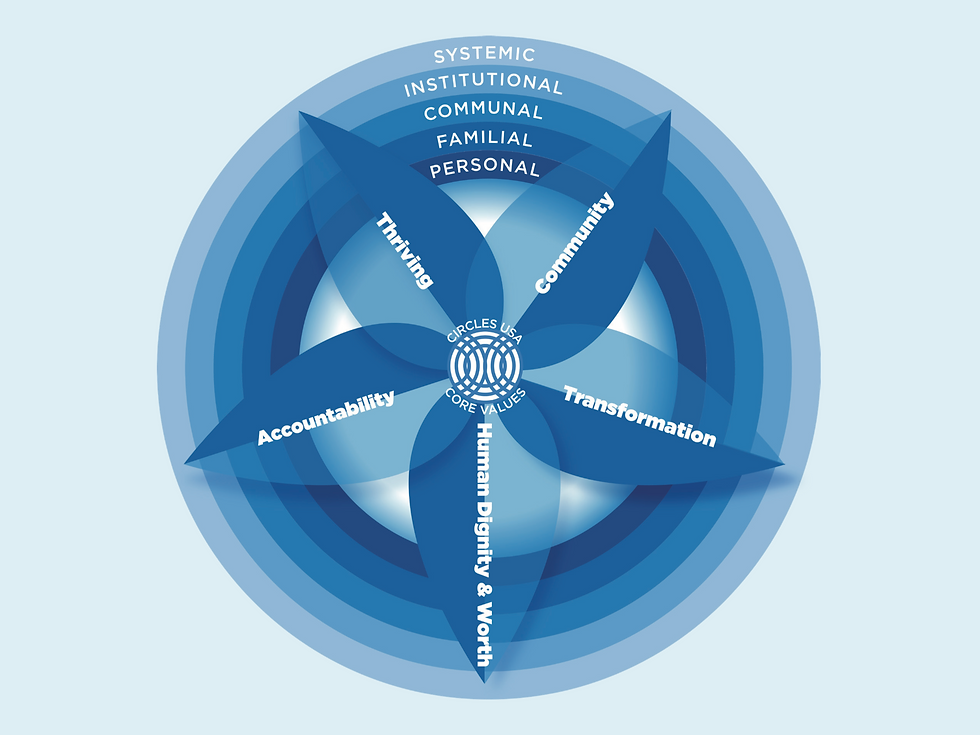Transactional vs Transformational
- May 19, 2024
- 3 min read
Updated: Sep 22, 2024
“Transformation moves at the speed of relationships, the speed of trust.”
Frederic Laloux, Reinventing Organizations
After 25 years in the anti-poverty arena, the Circles USA model has shown that relationships over time are the secret sauce of Circles. Trust is our currency. Our experience and our data show that people need community-based relationships to leave poverty behind permanently. This is the difference between being transactional versus transformational.
Think about different teachers you had when you were growing up. Some were transactional, getting the job done. They took attendance, knew your name, taught the subject, graded the papers, and let the system do the heavy lifting. You may have learned quite a bit from them or you may have not, but they checked all the boxes and cranked through the student rosters they were assigned each year. In return, you checked your boxes: from homework on due dates to required attendance, you understood the bare minimum performance required to pass their class and graduate.
Now consider that other teacher…you know. THE ONE. Yes, that teacher who really saw and heard you as an individual, who touched a wounded place in your heart and brought it back to life, who got you to believe in yourself when you didn’t even know who you were. That teacher probably did everything the transactional teacher did, then stopped you for a moment in the doorway before entering the classroom. They looked into your eyes and asked how your baby sister was doing…or how your basketball game was…or if you’d had breakfast yet.
This transformational person had an individualized perception of you, took the time to get to know you, see you, hear you, and invest in you at this crucial moment in your life. And somehow, you had the sense that your response mattered: If you hadn’t eaten that day, the teacher would slip you a breakfast burrito and not mind you eating it in class. A relationship that might have been rote became alive and dynamic, based on active listening, responsiveness, and mutual trust. Suddenly, succeeding in that teacher’s course took on a new importance—for the teacher and for you. You truly cared for each other. You were each transformed by your relationships with each other.
Circles holds the safe space for this same experience. With training and practice, everyone in a Circles chapter, from staff to volunteers to participants, come to listen intently, connect deeply, and build healthy relationships. In this space of mutuality, we redistribute the power dynamic to be equal partners on the journey regardless of race, class, religion, ability, or gender (just to name a few aspects that impact power in our society). We hold the space for EVERYONE involved in Circles to learn and grow at their own pace, to make their own goals that are right for them, and to release false and limiting beliefs that have held them back in the past. And, we work together to create a new system in which everyone can thrive, not just an exclusive few.
Circles is transformational in ways other agencies or organizations are not. Because we make direct and personal space for relationship building over time, participants at every level experience more than checking a box or hitting a quota for sheer volume of people served. The CUSA model centers quality and depth of connection so that any progress made is permanent—not just a flash in the pan.
People need time and support to learn new behaviors, think new thoughts, and head in new directions. We know that long-term, high-impact change requires not only a shift in behavior but also a shift in narrative. Circles fosters the deepened understanding to create this shift and offers a space to practice. We get to make mistakes and then try again, to practice showing up for each other week in, week out, and to support each other in all our messy goodness.
The transformative power of Circles happens when we keep it real, keep it humble, and keep it together. Community matters when it comes to ending poverty. Each person has something to give and something to learn, something to heal and something to offer up that is uniquely that person’s gift to the world. Transformation is collaborative.
So, what might you do today to shift from being transactional to transformational? All it takes is one moment of intentionality—a breath, a pause, a kindness—to really see and hear someone. Go beyond checking the boxes. You are a potential catalyst for transformation every day. And this is how we transform communities, moment by moment, person by person, until we have grown into a new expression of community where everyone thrives, has a deep sense of meaning and belonging, and no one experiences poverty ever again. It is possible, and it starts with you. Thank you for practicing the art of transformation today.






Comments